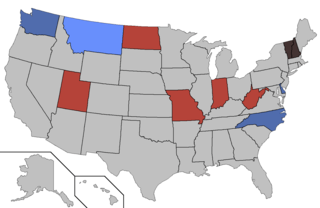United States gubernatorial elections, 2020
|
| ||
| ||
13 governorships 11 states; 2 territories | ||
|---|---|---|
|
| ||
 Democratic incumbent eligible for re-election Term-limited or retiring Democrat Republican incumbent eligible for re-election Term-limited or retiring Republican Undetermined incumbent No election | ||
United States gubernatorial elections will be held on November 3, 2020 in 11 states and two territories. In addition, special elections may take place (depending on state law) if other gubernatorial seats are vacated. The last regular gubernatorial elections for nine of the eleven states took place in 2016. The last gubernatorial elections for New Hampshire and Vermont will have taken place in 2018, as the governors of both states serve two-year terms. All state governors will be eligible for re-election, save for Steve Bullock of Montana, although other governors may choose to retire. The 2020 gubernatorial elections will take place concurrently with several other federal, state, and local elections, including the presidential election.
Race summary
States
| State | Incumbent | Party | First elected | Incumbent status | Candidates |
|---|---|---|---|---|---|
| Delaware | John Carney | Democratic | 2016 | Eligible | |
| Indiana | Eric Holcomb | Republican | 2016 | Eligible | |
| Missouri | Mike Parson | Republican | 2016 | Eligible | |
| Montana | Steve Bullock | Democratic | 2012 | Term-limited | |
| New Hampshire | TBD | TBD | TBD | TBD | |
| North Carolina | Roy Cooper | Democratic | 2016 | Eligible | |
| North Dakota | Doug Burgum | Republican | 2016 | Eligible | |
| Utah | Gary Herbert | Republican | 2010 | Retiring | |
| Vermont | TBD | TBD | TBD | TBD | |
| Washington | Jay Inslee | Democratic | 2012 | Eligible | |
| West Virginia | Jim Justice | Republican | 2016 | Eligible |
Territories
| State | Incumbent | Party | First elected | Incumbent Status | Candidates |
|---|---|---|---|---|---|
| American Samoa | Lolo Letalu Matalasi Moliga | Democratic | 2012 | Term-limited | |
| Puerto Rico | Ricky Rosselló | PNP | 2016 | Eligible |
Republican incumbent eligible for election
Missouri
One-term incumbent Governor Mike Parson, who took office upon Eric Greitens' resignation, is eligible for election to a full term in 2020.
State Auditor Nicole Galloway is considered a potential candidate.[1]
Republican incumbent eligible for re-election
Indiana
One-term incumbent Governor Eric Holcomb is eligible for re-election in 2020.
North Dakota
One-term incumbent Governor Doug Burgum is eligible for re-election in 2020.
West Virginia
One-term incumbent Governor Jim Justice is eligible for re-election in 2020. Justice was elected as a Democrat, but later switched to the Republican Party.[2]
Attorney General Patrick Morrisey, retired Olympic gymnast Mary Lou Retton,[3] and Secretary of State Mac Warner were mentioned as potential general election challengers, prior to Justice's decision to join the Republican Party.
Retiring and term-limited Republican incumbents
Utah
Two and a half-term incumbent Governor Gary Herbert is eligible for re-election in 2020, as Utah does not have gubernatorial term limits. However, he announced shortly after being re-elected in 2016 that he will not run for a third full term.[4]
Josh Romney (son of Mitt Romney) has expressed interest in running.[5]
Democratic incumbents eligible for re-election
Delaware
One-term incumbent Governor John Carney is eligible for re-election in 2020. State Treasurer Ken Simpler is a potential Republican candidate.[6]
North Carolina
One-term incumbent Governor Roy Cooper is eligible for re-election in 2020.
Lieutenant Governor Dan Forest is a potential Republican candidate.[7]
Puerto Rico
One-term incumbent Governor Ricky Rosselló of the New Progressive Party is eligible to run for re-election in 2020.
Washington
Two-term incumbent Governor Jay Inslee is eligible to run for re-election in 2020, as Washington does not have gubernatorial term limits.
Potential Republican candidates include 2016 nominee Bill Bryant.[8]
Retiring and term-limited Democratic incumbents
American Samoa
Two-term incumbent Governor Lolo Letalu Matalasi Moliga, an independent, is term-limited in 2020.
Montana
Two-term incumbent Governor Steve Bullock is term-limited in 2020. Former Democratic Governor Brian Schweitzer may run again.[9] Attorney General Tim Fox is a potential Republican candidate.[10]
Undetermined incumbents
New Hampshire
The incumbent for this election will be determined in the 2018 election.
Vermont
The incumbent for this election will be determined in the 2018 election.
See also
References
- ↑ Jason Rosenbaum & Jo Mannies (July 13, 2018). "Politically Speaking: Breaking down two high-stakes statewide contests on Missouri's primary ballot". St. Louis Public Radio. Retrieved August 18, 2018.
- ↑ "West Virginia Undergoing Political, Generational Change". New York Times. August 3, 2017. Retrieved August 3, 2017.
- ↑ "West Virginia Undergoing Political,o Generational Change". Roll Call. May 1, 2014. Retrieved January 18, 2017.
- ↑ Gehrke, Robert (8 November 2016). "Herbert wins his 3rd election as Utah governor". The Salt Lake Tribune. Retrieved 21 November 2016.
- ↑ Boyd, Hal (29 January 2017). "When it comes to future political leaders, Utah is in 'good hands'". Deseret News. Retrieved 9 February 2017.
- ↑ "Simpler to press for fiscal reforms in bid for second term as State Treasurer". Delaware Business Now. November 7, 2017. Retrieved June 5, 2018.
- ↑ Bell, Adam (November 8, 2016). "Republican Forest defeats Coleman for NC lieutenant governor". The Charlotte Observer. Retrieved December 10, 2016.
- ↑ Mandel, Eric (January 11, 2017). "Bill Bryant hints at another run for governor in 2020". My Northwest. Retrieved January 11, 2017.
- ↑ "Schweitzer listed as possible energy secretary in 2008". Bozeman Daily Chronicle. November 6, 2016. Retrieved January 4, 2017.
- ↑ Erickson, David (June 2, 2017). "News site Politico says Montana AG Tim Fox won't challenge Tester in '18". Missoulian. Retrieved January 21, 2018.